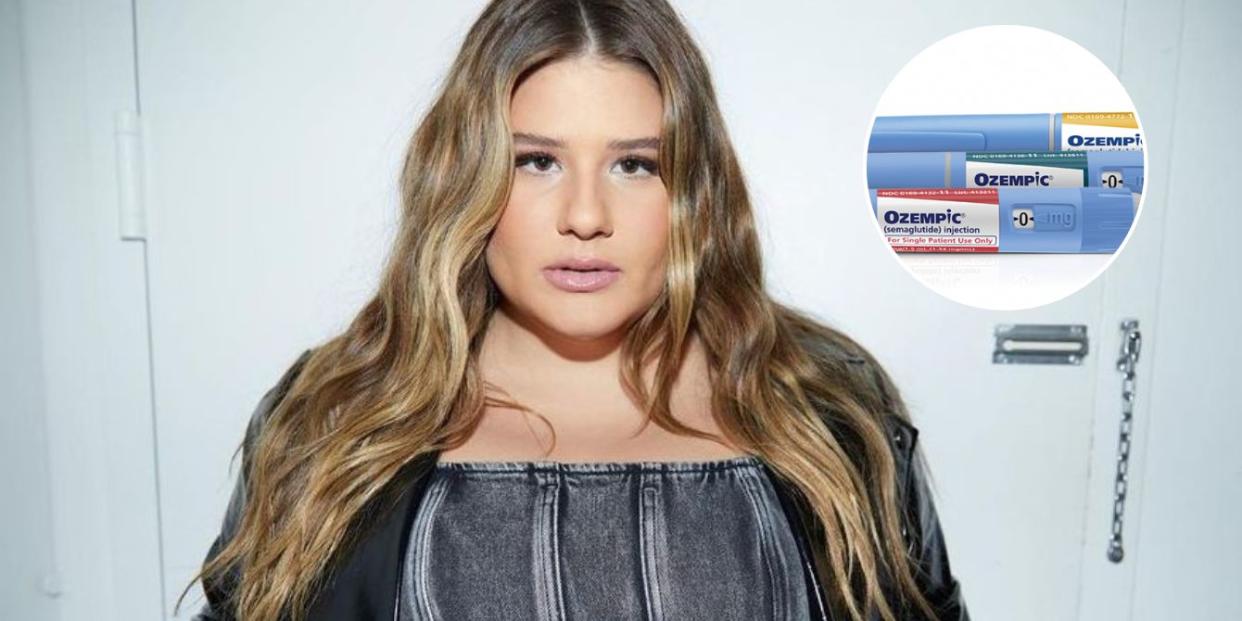TikTok influencer gets real about her struggles with popular weight loss drug Ozempic

[Content warning: Discussions of weight loss and diet culture.]
You can’t scroll through TikTok (or any celebrity story for that matter) without hearing women talk about Ozempic. One popular TikTokker and model, Remi Bader, is opening up about the side we don’t often hear when it comes to Ozempic—what happens when you stop taking it.
“I’m like, almost annoyed that it’s this trendy thing now when I went on it for actual issues,” she tells Amanda Hirsch on the popular Not Skinny But Not Fat podcast. Though according to Bader, she was prescribed Ozempic before it was “trendy.”
What is Ozempic?
Ozempic, also known by its generic name semaglutide, is a medication used to improve blood sugar control in adults with type 2 diabetes. Ozempic is an FDA-approved prescription medication that is also prescribed for weight loss, as it stimulates insulin production and also targets areas of the brain that regulate appetite. The medication is administered an injection under your skin once a week, and it’s usually self-injected.
In recent years, people have been sharing their experiences with Ozempic and (both diabetic and non-diabetic-related) weight loss on social media. So much so that now, according to the FDA website, there is a shortage of the drug.
On the podcast, Bader said she didn’t feel Ozempic was the best treatment for her. While she did lose weight, when she stopped taking it her binge-eating disorder—which she says she’s struggled with for years—returned with a vengeance.
“They said I need this. And I had a lot of mixed feelings,” she said of doctors prescribing her the drug. “A few months later I went off it and got into the bad binging.”
“I saw a doctor and they were like, it’s 100% because I went on Ozempic,” Bader continued. “It was making me think I wasn’t hungry for so long, I lost some weight. I didn’t wanna be obsessed with being on it long term. I was like, I bet the second I got off I’m gonna get starving again. I did, and my binging got so much worse. So then I kind of blamed Ozempic.”
Once she stopped taking it, Bader claims she “gained double the weight back” after stopping the medication and she thinks it really should just be used for patients with diabetes.
Ozempic and Hollywood
Outside of the social media influence sphere, Hollywood as a whole has been contributing to the Ozempic craze. Last year, Variety reported on how the drug is now part of the norm among celebrities:
Moguls, reality starlets, veteran film producers and, of course, actors are quietly singing the drug’s praises on Signal, the encrypted messaging app mostly used for confidential conversations. Hair, makeup and styling teams for celebrities have come to accept the injections as part of grooming rituals ahead of major events. In a matter of months, it has become the worst-kept secret in Hollywood – especially given that its most enthusiastic users are not pre-diabetic and do not require the drug. It is currently being supplied by doctors and nutritionists, though rumor has it you can also score the drug at medical spas in Arizona.
It’s been rumored that stars like Kim and Khloe Kardashian, Mindy Kaling and even Adele have used the drug to “slim down.”
While there are many problematic elements at play here—a diabetes medication being used to help celebrities fit into gowns isn’t a great look—if societal fatphobia wasn’t as horrific as it is, this would, arguably, be a non-issue. But given the way the fat population is treated by the medical community, Hollywood, social media, fashion brands, etc., it’s honestly understandable why people would gravitate to injecting themselves weekly for $1200-$1500 a month just to fit societal beauty standards. Is it “right?” Well, assigning morality to food and thinness is how diet culture prospers, so that’s not for anyone to say, really. It’s an unfortunate truth, but a truth nonetheless.
Dr. Caroline Apovian, co-director of the Center for Weight Management and Wellness at the Brigham and Women’s Hospital in Boston, tells PEOPLE that the increase in demand for Ozempic is concerning because those in need of the drug aren’t getting it.
“We’re not talking about stars who need to lose 10 pounds,” Apovian says. “We’re talking about people who are dying of obesity, are going to die of obesity. You’re taking away from patients with diabetes,” she continued. “We have lifesaving drugs… and the United States public that really needs these drugs can’t get them.”

